The Sudanese military has regained control of the presidential palace in Khartoum, marking a significant milestone in its ongoing conflict with the paramilitary RSF. While this victory signifies military advancement, the broader humanitarian crisis in the country continues to escalate, resulting in extensive casualties and displacements among civilians. The conflict highlights the deep instability and challenges facing Sudan since the overthrow of its previous regime.
On Friday, the Sudanese military announced that it had regained full control of the presidential palace in Khartoum from the paramilitary Rapid Support Forces (RSF). This development marks a significant advancement in the ongoing conflict that has persisted for two years, posing a threat to the nation’s stability. The Republican Palace had remained the last stronghold for the RSF in the capital, indicating the military’s persistent efforts to reclaim territory.
Social media platforms showcased footage of soldiers inside the palace, celebrating the reclaiming of the compound on what they declared as the 21st day of Ramadan. The presence of military personnel equipped with assault rifles and other weaponry was evident, as they celebrated their victory by chanting, “God is the greatest!” The condition of the palace displayed significant damage, symbolizing the turmoil that has erupted in Sudan since the onset of hostilities.
The Republican Palace, historically the center of governance during British colonial rule, has seen notable moments in Sudan’s history, including the raising of the first independent Sudanese flags in 1956. Its recapture signifies a substantial breakthrough for Sudan’s military forces, led by General Abdel-Fattah Burhan, especially amidst the ongoing military tensions initiated in 2023 when conflict between the military and the RSF escalated.
Despite the military’s gains, the RSF has not publicly accepted the loss, and fighting is likely to continue, given that they maintain control over other territories within Sudan. The conflict, significantly exacerbated by the violence since its inception in April 2023, has resulted in substantial humanitarian crises, leading to reports of extensive casualties and displacements among civilians.
The ongoing civil unrest follows the ousting of autocratic President Omar al-Bashir in 2019, which had offered a brief glimpse of a democratic transition. However, this was short-lived due to a coup led by Burhan and Dagalo in 2021, further initiating conflicts between the RSF and the national military. Long-standing allegations of human rights abuses have since emerged against both factions, with reports of genocide and violent crimes against various ethnic groups.
As Sudan continues to grapple with these significant challenges, the recent military successes reflect a changing dynamic within the power struggle, posing critical questions about the future stability and governance of the nation.
In summary, the Sudanese military’s recent reclamation of the presidential palace marks a pivotal moment in a prolonged conflict with the Rapid Support Forces. Despite this territorial gain, the broader humanitarian crises and ongoing violence indicate a complex and turbulent journey ahead for Sudan. The interplay between military power and the struggle for governance remains fraught with risks for civilian safety and national stability.
Original Source: www.france24.com




